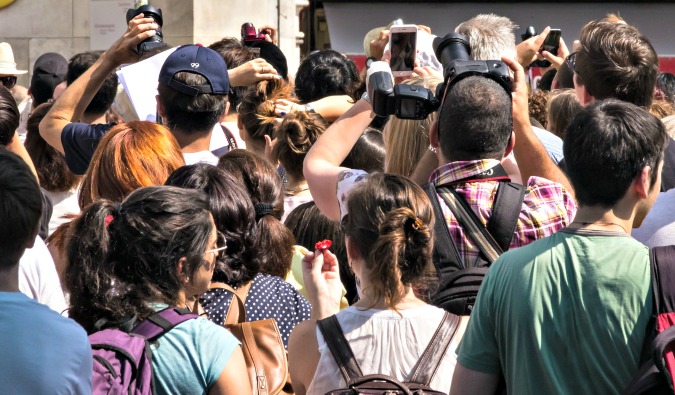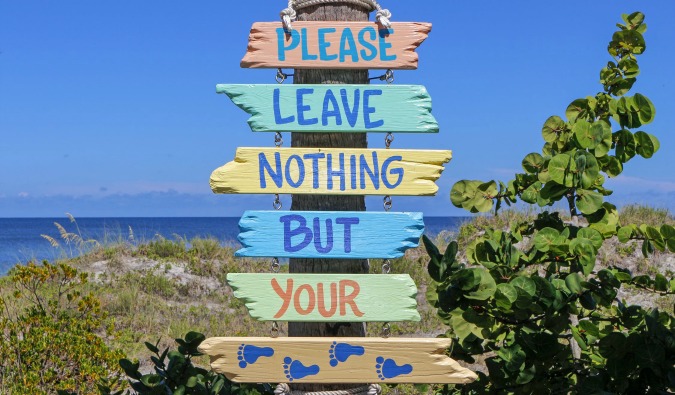
Updated: 10/25/20 | October 25th, 2020
Years later, I returned to the scene of the crime: Costa Rica. It was in that country that I first fell victim to the travel bug, a disease that would infect me for the rest of my life and lead me to where I am today. There was no place I was more excited about revisiting than Manuel Antonio National Park. Its wild jungles, deserted beaches, and bountiful animal life was the highlight of my first visit and I couldn’t wait to relive it all in this seaside town.
But then wonder turned to horror.
The quiet road to town was lined with endless fancy resorts. Hotels lined the park’s edge. Tour groups cluttered the once peaceful park. They fed the wildlife. They littered. The abundant troops of monkeys had vanished. So had the colorful land crabs. No deer roamed. And the beaches were a sea of bodies.
It was my first experience with seeing a destination shift into “overtourism.”
Overtourism is the term used to describe the onslaught of tourists who take over a destination to a point where the infrastructure can no longer handle it.
While not a new problem (that trip to Costa Rica was in 2011), this “trend” has been in the news a lot the past few months (heck, there’s even a Twitter feed about it) as many destinations have started to push back against the onslaught of visitors inundating their streets, communities, and overtaking their natural resources.
“Stay home!” they scream to visitors. “You’re no longer welcome!”
I believe travel can change the world. Done right, it expands people’s minds, fosters understanding, makes you a better you, and provides an economic boost to local communities.
But, thanks to cheap flights, the sharing economy, and (let’s be honest) an explosion of Chinese tour groups around the world, destinations have gotten a bit crowded lately.
I see it everywhere I travel these days.
There’s the Palace of Versailles, where years ago, I was able to film a video free of crowds. Now, it’s wall-to-wall tour groups slowly shuffling from room to room in the most insane queue ever. Its hard to even enjoy the experience!
There’s Tulum, once a quiet Mexican town, now awash with Westerners trying to turn it into the new Bali (which is also overrun with tourists and where “digital nomads” can float from yoga studio to cafe to retreat to wherever without ever actually having to interact with locals).
There’s Iceland, where Reykjavik’s main street, complete with a Dunkin’ Donuts, is now a sea of people, and the city’s roads are cluttered. (Don’t even get my Icelandic friends started on this subject. They are none too happy about all the tourists.)
There the crushing crowds in Prague, Barcelona, Paris, Venice, Edinburgh, the Gili Islands, Ko Lipe, Chiang Mai, and Queenstown, where tourists are overrunning locals, acting idiotically, and littering.
Sure, crowded destinations are simply a by-product of a globalized world where travel has become attainable for more and more people. The number of international tourist arrivals is expected to increase by 3.3% worldwide each year until 2030 when it will reach 1.8 billion. And, on balance, that’s a good thing if you believe in travel as a transformative tool.
Yet the very things that make travel cheaper — budget airlines, Airbnb, ridesharing, etc. — have also made destinations unable to cope with all the visitors — and pushed out locals in the process.
Now they are starting to push back.
Barcelona is no longer allowing new hotels and is limiting the number of cruise ships.
Dubrovnik is floating the idea of putting limits on the number of tourists.
Chile is curbing the number of tourists to Easter Island and how long they can stay and Ecuador is doing the same for visitors to the Galápagos.
Venice is trying to restrict Airbnb and the number of tourists (after restricting cruise ships).
Paris is also restricting Airbnbs in the city.
Iceland wants to limit the number of foreigners who buy property.
Amsterdam is launching a campaign to reign in the partying in the city.
Majorca has had continuous protests against tourists.
The world is saying “enough!”
And I, for one, am all for this.
Of course, I don’t think people intentionally try to “ruin” places. No one is saying, “Let’s go overcrowd Iceland and piss locals off!”
Most people just don’t even think of their actions causing harm.
Which makes education and these initiatives even more important.
Because there definitely needs to be a better balance between visitors and residents. Overtourism doesn’t help anyone. No one wants to visit a crowded destination – and no one wants to live somewhere that’s overrun with tourists.
While no one is talking about banning tourists outright, there should be better ways to control their numbers and the problems overtourism causes.
Take Airbnb. It’s one of the biggest problems in travel today (which is a shame, because I used to love the service).
It started out as a way for residents to earn money on the side and get travelers out of the hotel/hostel dynamic and into a more “local” way of life.
But that original mission has been perverted. As rentals have become more lucrative, Airbnb has turned a blind eye to the fact that real estate companies, property managers, and other individuals can list as many properties as they want.
These companies, tapping into tourists’ desire to have a home away from home, buy up properties in the city center, which then decreases the supply of rental properties for locals, increases rental prices, and forces residents out.
Driving locals out defeats the purpose of using the service! Too many town centers have been decimated by Airbnb. While a man’s home is his castle, I do believe there should be some restrictions on Airbnb because it’s driving people out of city centers. That’s not good for anyone, especially the locals who live there and, since Airbnb won’t do anything about it, local governments need to step in and start cracking down.
Personally, I’ve started to only rent rooms in an Airbnb (instead of an entire property) so I know there’s a local there benefiting from my stay. Rooms is their new version of what Airbnb used to be: when you rent space in someone’s home or stay in their guesthouse. It’s cheaper, you get to meet the host, and you don’t contribute to overtourism. It’s a triple win.
“But what about social media?” you may ask.
One can’t deny that YouTubers, Instagram “influencers”, and bloggers like myself have helped popularize travel and made it more accessible to the masses by destroying the myth that it’s an expensive thing only a few can do. We’ve shed light on destinations around the world and gotten people to visit places they might not have otherwise.
I don’t feel bad about that.
More people should travel.
And there’s always been the idea of that travel media “ruins” a place. The Lonely Planet effect. The Rick Steves effect. The Bourdain effect (which I experienced first hand since he came to my hometown).
I mean people have been opining about mass tourism for decades. Once it’s in the Lonely Planet, a place is dead, right?
But social media has an amplifying effect that didn’t exist in the past. It makes it easier for everyone to find – and then overrun a destination.
Do I really think my one article on (insert destination) created a crush of people like there is some Nomadic Matt effect? No.
But social media and blogging leads one person to a place and then another and then another and then suddenly everyone is taking a picture of themselves with their feet dangling over Horseshoe Bend, sitting on that rock in Norway, or having breakfast with giraffes at that hotel in Kenya.
Everyone wants to do what they see on social media so they can tell all their friends how cool and well-traveled they are.
This is also one of the downsides of the Internet. For me, travel is an act of discovery – and respect – and we constantly talk about being a respectful traveler but, for many influencers and bloggers, they don’t balance their actions and influence with responsible travel (I mean you had Fun for Louis rationalizing his North Korea propaganda movies) and try to educate their audiences to become better, more respectful travelers.
After all, we are as much a part of the solution as we are part of the problem. There are ways to mitigate your impact and create a mutually beneficial relationship between you and the local population.
Here are seven ways I think we can help mitigate the overtourism crisis:
1. Skip Airbnb homes – Airbnb is one of the biggest villains in this whole drama. Don’t rent an entire Airbnb home unless you can be 100% sure that you are renting from a real human who is just on vacation. Look at the photos, talk to the host, ask them if they live there. If this is a rental company or the person has multiple listings, skip them. Don’t contribute to the emptying of communities. Rent a room instead!
Instead, use “Rooms.” This Airbnb feature lets you search for listings in people’s homes or guest houses. It’s like how Airbnb used to be — people renting out extra rooms or guest houses for added cash. You always get your own room and, sometimes, a private entrance. You’ll also get to interact with your host, who can provide lots of insider tips and insight to your destination.
2. Spread your travels around – Don’t stick to the most popular areas in a destination. Travel outside the city center. Visit the smaller neighborhoods. Get out into the countryside! Getting off the beaten path not only means fewer tourists but also spreading the benefits of your tourism around. There’s more to Italy than Venice, more to Spain than Barcelona (seriously, nearby Costa Brava is amazing), more to Iceland than Reykjavik, more to Thailand than Pai, more to everywhere than where everyone is posting photos from! Get out there and find those hidden gems!
3. Visit in the shoulder season – A corollary to the above is to not visit during peak season. If you visit a place when everyone else does because “it’s the best time to go,” you’re just contributing to the crowds (plus facing peak-season prices). Travel during the shoulder season, when the crowds are fewer, the prices lower, and the weather still (mostly) nice.
4. Don’t eat in touristy areas – If you eat where all the other tourists are, you’ll pay more for lower-quality food. Open Google Maps, Foursquare, Yelp, or your guidebook and find restaurants where locals eat. Follow my five-block rule: always walk five blocks in any direction and cross the invisible line most tourists don’t. You’ll get away from the crowds, spread your tourism dollars around, and enjoy a more authentic experience.
5. Be an informed traveler – Read up on the destination before you go. Learn its customs. Learn its laws. Learn its history. The more respectful and knowledgeable you are, the better it is for everyone involved!
6. Don’t be a drunk idiot – Part of the growing pushback against tourists is not just their sheer number but their disrespectful behavior too. Heck, that is part of why the folks in Amsterdam are upset — they’re tired of drunk tourists! If you’re going someplace just to party, don’t go! You can get drunk back home. Don’t treat a destination like it’s your playpen. People live there after all! Treat them with kindness. You’re a guest in their home.
7. Be environmentally friendly – Finally, don’t waste a place’s (limited) resources. Don’t leave the lights on. Don’t litter. Don’t take long showers. Don’t involve yourself in environmentally dubious activities. The more you can preserve a destination, the longer it will last and the more the locals will want tourists like yourself there. After all, if you ruin it, how will you ever be able to go back? Here are some resources on the subject:
- Is eco-tourism really eco-friendly?
- How to become a sustainable traveler
- How to ethically volunteer anywhere in the world
Overtourism has been written about a lot lately (see the plethora of links from above) and it’s an issue I’ve been thinking about by another name for years and especially this summer as I jostled through the crowded streets of Amsterdam and my home away from home of New York City.
I think we’re going to see a lot more destinations limiting the number of visitors and placing restrictions on the travel industry. People are just fed up – and they have every right to be.
Let’s not love places to death. Just like it’s important to protect animals and the environment when we travel, so too is it important to protect residents and the destinations themselves.
Do I think lots of tourists are suddenly going to go “Oh, I didn’t realize we were doing this! Let’s change our ways!”?
Nope.
I think tourist behavior will, for the most part, continue as before. I think tourists are still going to act stupid. I think people will still be short-sighted.
But I’m glad this subject is being talked about. I’m glad there is more action around the issue.
We’re the cause – and part of the solution – to this problem and, the more responsible we act, the better it is for everyone involved.
Overtourism is a problem that can only be solved by residents and tourists together.
Book Your Trip: Logistical Tips and Tricks
Book Your Flight
Find a cheap flight by using Skyscanner. It’s my favorite search engine because it searches websites and airlines around the globe so you always know no stone is being left unturned.
Book Your Accommodation
You can book your hostel with Hostelworld. If you want to stay somewhere other than a hostel, use Booking.com as it consistently returns the cheapest rates for guesthouses and hotels.
Don’t Forget Travel Insurance
Travel insurance will protect you against illness, injury, theft, and cancellations. It’s comprehensive protection in case anything goes wrong. I never go on a trip without it as I’ve had to use it many times in the past. My favorite companies that offer the best service and value are:
- SafetyWing (best for everyone)
- Insure My Trip (for those 70 and over)
- Medjet (for additional evacuation coverage)
Want to Travel for Free?
Travel credit cards allow you to earn points that can be redeemed for free flights and accommodation — all without any extra spending. Check out my guide to picking the right card and my current favorites to get started and see the latest best deals.
Need Help Finding Activities for Your Trip?
Get Your Guide is a huge online marketplace where you can find cool walking tours, fun excursions, skip-the-line tickets, private guides, and more.
Ready to Book Your Trip?
Check out my resource page for the best companies to use when you travel. I list all the ones I use when I travel. They are the best in class and you can’t go wrong using them on your trip.


